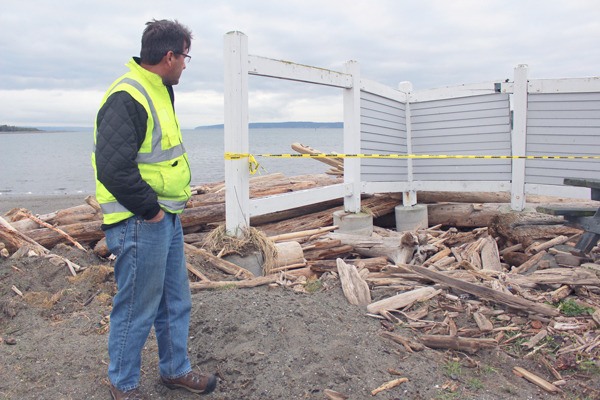Back-to-back spring storms pummeled Oak Harbor’s Windjammer Park, eroding beach front and flinging tons of driftwood into the park.
City workers used tractors to push most of the wood back to the beach, but the mess isn’t all cleaned up yet.
The public can chip in at a work party scheduled for noon, Sunday April 24 at the park. Meet near the basketball courts on the east side of the park.
The work party is being organized by Erin Hedrick, manager of the Oak Harbor Starbucks next to Safeway.
“We were walking down there and I noticed all the driftwood everywhere,” she said.
Her company encourages its employees to participate in community service and she thought this would be the right project. She’s coordinating with the city parks department, which plans to provide equipment.
Starbucks will provide refreshments.
Winter weather this year did a number on Oak Harbor’s waterfront, and the wind and tides from two window rattler storms last month walloped the park. Small hunks of driftwood remain strewn around the waterfront.
On the beach, mounds of driftwood lie tangled on the beach and choke the entrance to the lagoon.
The storms also damaged windbreakers that shelter picnic tables and some places eroded up to 8 feet of beachfront. Yellow caution tape is strewn around the windbreakers, some of which no longer have ground supporting foundations.
The city will likely remove the windbreakers and eventually the picnic tables, said parks director Hank Nydam.
“Originally the intent was to keep them,” he said. “But now I’m throwing in the towel.”
Since they were built with state money, they have to talk with state officials first. And the city will need to obtain a shoreline permit to backfill the ground that eroded during the storms.
Anyone from the community can help at the work party. The plan is to move the remaining rogue driftwood back to the beach, where the tide will take eventually take care of business. By state law it’s illegal to remove driftwood from the beach.
Parks workers will clear the entrance to the lagoon with machines — something they typically do before summer.
“A lot of bodies and helping hands will make this happen faster,” Nydam said.




